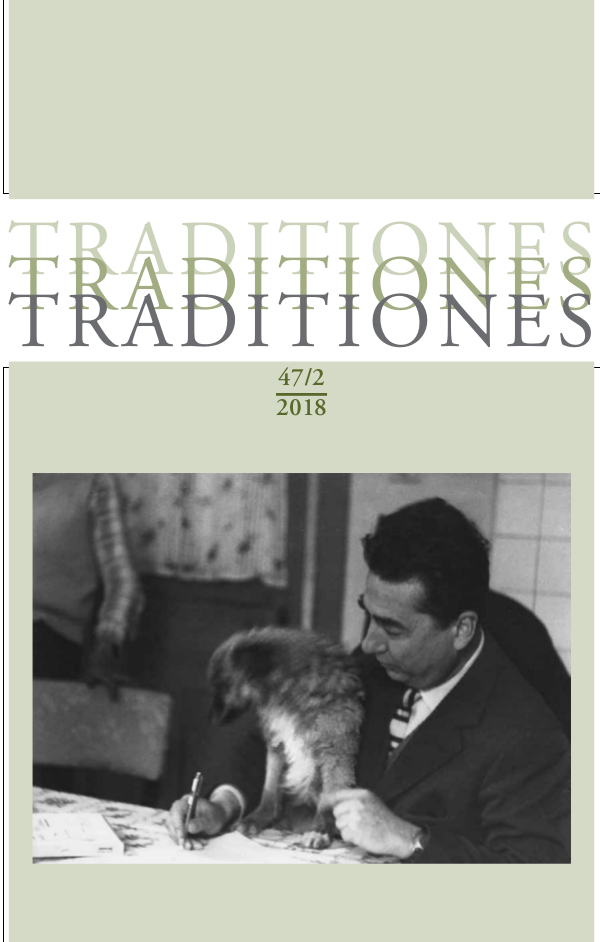Glasba brez družbenega življenja: harmonikar Mihail Soročinski, ne-poustvarjalni glasbenik iz Smolenskega okrožja
DOI:
https://doi.org/10.3986/Traditio2018470203Ključne besede:
traditional music, Russia, performer-centered research, solitary music-making // ljudska glasba, Rusija, raziskava o izvajalcu, samohodniško muziciranjePovzetek
Against the background of generally low music activity in rural Russia, the button accordion (garmon’) player Mikhail Sorochinsky from the Smolensk province (Smolenskaja oblast) lives an intensive yet solitary musical life. The paper presents Sorochinsky’s artistic development and his not always easy relation to his social and musical environment. Further, the historical background of solitary music-making is discussed as well as socially and musically meaningful emotions.
***
Glasbenik Mihail Soročinski iz okrožja Smolensk, ki igra na kromatično (gumbno) harmoniko (garmon’), živi zelo intenzivno, a tudi samotno glasbeno življenje, kar je v nasprotju z dejstvom, da je v ruralni skupnosti v Rusiji malo muziciranja. V članku sta predstavljena njegov umetniški razvoj in ne vedno enostavno razmerje z lastnim družbenim in glasbenim okoljem. Avtor razpravlja o zgodovinskem ozadju njegovega samohodnega muziciranja kot tudi o družbeno in glasbeno pomembnih čustvih.
Prenosi
Literatura
Adonieva, Svetlana. 2006. Derevenskaia chastushka XX veka [The Rural chastushka of the 20th Century]. Sankt-Peterburg: Izd. SPbGU.
Christensen, Dieter. 1960. Inner Tempo and Melodic Tempo. Ethnomusicology 4: 9–14.
Famintsyn, Aleksandr. 1890. Gusli: Russkii narodnyi muzykal’nyi instrument [The gusli: A Russian Folk Musical Instrument]. Sankt-Peterburg: Tip. Akad. nauk.
Glassie, Henry. 1995. Tradition. The Journal of American Folklore 108 (430): 395–412.
Iunoki-Oiė [Yunoki-Oie] Kaori. 2004. Balalaika v bezpis’mennoi tradicii dovoennogo vremeni [The Balalaika in Oral Tradition of the Pre-War Period]. Moskva: RAM im. Gnessinykh.
Killick, Andrew. 2006. Holicipation: Prolegomenon to an Ethnography of Solitary Music-Making. Ethnomusicology Forum 15 (2): 273–299.
Klusen, Ernst. 1969. Volkslied, Fund und Erfindung. Köln: Gerig.
Klusen, Ernst. 1989. Singen: Materialien zu einer Theorie (Perspektiven zur Musikpädagogik und Musikwissenschaft; 11). Regensburg: Bosse.
Koshelev, Vladimir Vasilievich. 1994. Skomorokhi i skomoroshia professiia [Skomorokhi and skomorokh Profession]. Sankt-Peterburg: Khronograf.
Merriam, Alan P. 1964. The Anthropology of Music. Evanston, Illinois: Northwestern UP.
Mikhailova, Aleftina. 2010/2011. “Saratovskie Perebory”: Kanonicheskie osnovy v interpretatsii traditsionnogo garmoshechnogo naigrysha [“Saratov fingerpicking”: Canonic Principles in Interpretation of Traditional playing the melodeon [sic]. PAX SONORIS IV–V, 211–213.
Morgenstern, Ulrich [s. also: Morgenshtern, Ul’rikh]. 2007. Die Musik der Skobari: Studien zu lokalen Traditionen instrumentaler Volksmusik im Gebiet Pskov (Nordwestrußland): Vol. 1. Göttingen: Cuvillier.
Morgenstern, Ulrich. 2008. Der Skobarja von Velikie Luki und angrenzende instrumental-vokale Formen im Gebiet Tver’: Ethnische und ethnomusikalische Identität. In: Albrecht Schneider (ed.), Systematic and Comparative Musicology: Concepts, Methods, Findings (Hamburger Jahrbuch für Musikwissenschaft; 24). Frankfurt a.M. [...]: 399–442.
Morgenstern, Ulrich. 2009. Die Sackpfeifenmelodien der russischen Harmonikaspieler. In: Rolf Bader (ed.), Musical Acoustics, Neurocognition and Psychology of Music / Musikalische Akustik, Neurokognition und Musikpsychologie (Hamburger Jahrbuch für Musikwissenschaft; 25). Frankfurt a.M. [...]: Peter Lang, 201–232.
Morgenshtern, Ul’rikh [Morgenstern, Ulrich]. 2011. Russkaia chastushka kak ėtnomuzykovedcheskaia problema [The Russian chastushka as an ethnomusicological isue]. In: Nailia Al’meeva et al. (eds.), Fol’klor i my: Traditsionnaia kul’tura v zerkale ee vozpriiatiia. Sbornik nauchnych statei, posviashchennyi 70-letiiu I.I. Zemtsovskogo, ch. II. Sankt-Peterburg: RIII, 83–99.
Morgenstern, Ulrich. 2013. Dynamics of Identity in Russian Instrumental Folk Music Culture. Mūzikas akadēmijas raksti, 42–52.
Morgenstern, Ulrich. 2018. Towards the History of Ideas in Ethnomusicology: Theory and Methods Between the Late 18th and the Early 20th Century. Musicologist 2 (1): 1–31. Available at: http://dergipark.gov.tr/download/article-file/498520
Olson, Laura J. 2004. Performing Russia: Folk Revival and Russian Identity. New York [...]: Routledge Curzon.
Panchenko, Aleksandr. 1984. Russkaia kul'tura v kanun petrovskikh reform [The Culture on the Eve of the Reforms of Peter the Great]. Leningrad: Nauka.
Ronström, Owe. 1996. Revival Reconsidered. The World of Music 38 (3): 5–20.
Turino, Thomas. 2008. Music as Social Life: The Politics of Participation. Chicago: University of Chicago Press.
Zemtsovskii, Izalii. 1984. O prirode fol’klora v svete ispolnitel’skogo obshcheniia [On the Nature of Folklore in the Light of Performance Communication]. In: Antolii Kuklin (ed.), Iskusstvo i obshchenie. Leningrad: LGITMiK, 142–150.
Prenosi
Objavljeno
Kako citirati
Številka
Rubrike
Licenca
Avtorji jamčijo, da je delo njihova avtorska stvaritev, da v njem niso kršene avtorske pravice tretjih oseb ali kake druge pravice. V primeru zahtevkov tretjih oseb se avtorji zavezujejo, da bodo varovali interese založnika ter da bodo povrnili morebitno škodo.
Podrobneje v rubriki: Prispevki






